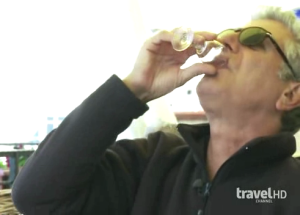If you’re looking to drink with the best of them, to turn a late Friday afternoon into an epic night of booze-fueled madness, a night that invariably ends in a tailspin of shame, sickness, or both, you could likely do no better than Anthony Bourdain as your guide.
Which is unfortunate for those of us who aren’t celebrity chefs or employees of the Travel Channel – we’re left with a bit less with which to work. Thankfully, the December/January issue of Men’s Journal magazine gives us a glimpse of what we’re missing out on: A Drunken Afternoon with Anthony Bourdain, by Mark Binelli.
Bourdain is described by the author not as a TV chef, but as “a television hedonist, luxuriating in the indulgences of an iron-stomached (and –livered) traveler.” He’s a man with a dream job: travel, eat, drink, repeat – and occasionally write.
I had the honor of meeting the Kitchen Confidential author a few years back when he did a Q-and-A session and signed autographs at the now-shuttered Penn Quarter Olsson’s bookstore. His careless attitude, freewheeling lifestyle, and hilarious commentary on his fellow chefs (most notably in my memory, referring to Giada De Laurentiis as a bobblehead) had the small crowd roaring.
But I digress; we were talking about how to drink. Bourdain’s an old-school drinker and took his cues – just as I did – from one of the greats: “In George Orwell’s Down and Out in Paris and London – one of Bourdain’s favorite books and a model for Kitchen Confidential – Orwell writes about his time doing scullery work in a Parisian restaurant, noting that ‘the power of swallowing quarts of wine, and then sweating it out before it can do much damage.’” Moreover, it’s simplicity Bourdain seeks. Although his dining companions are usually the crème de la crème of American dining – domestically at least – he appreciates a simple drink at the end of a long day’s work, even after all these years of cable-television sponsored travel and book promotion tours.
And afternoon drinking. Binelli concludes: “Bourdain hoists his fifth – or is it sixth? – Presidente. It’s still about 20 minutes before happy hour… ‘Getting fed, stealing good shit, drinking for free, getting laid. In our own little world, each of us was either good on our guitar or we weren’t. And that was nice. That would have been enough.’”





